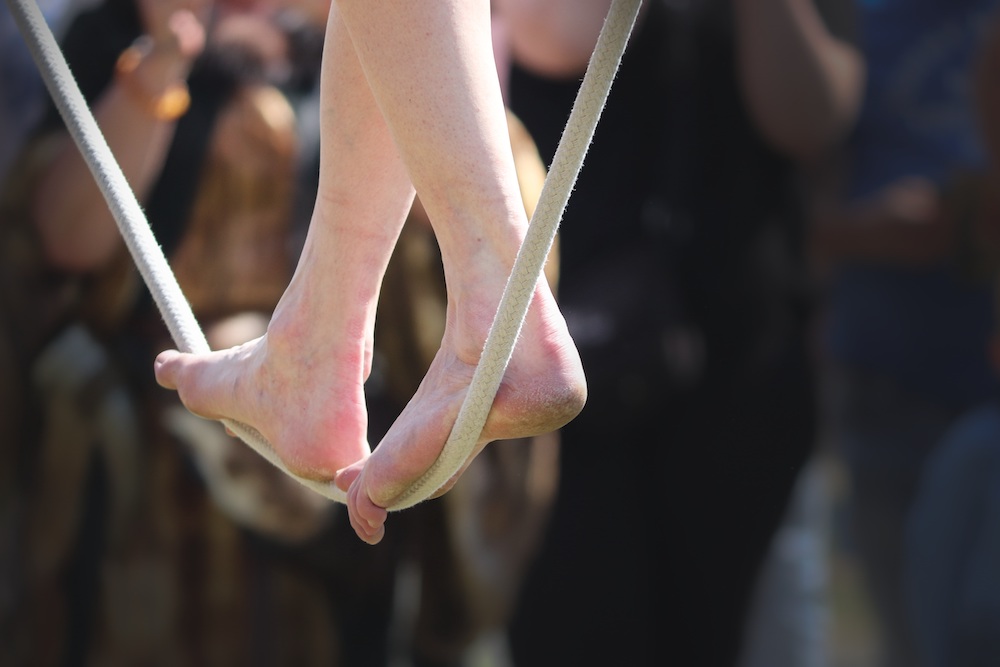
"Our democracy is in need of repair, and yet we face the possibility of falling on either side of the tightrope." (Pixabay/Manfred Richter)
Right-wing militia allegedly planned and almost executed a kidnapping of the governor of Michigan. They were outraged by her executive orders responding to the COVID-19 pandemic. They were associated with the Wolverine Watchmen, who seize on civil unrest to promote armed resistance, target and kill police, and forge alliances with other such groups to foment violence and civil war.
When I heard this, I felt the air go out of me. The divisions within our nation have been intensifying, but the overthrow of a legitimately elected governor by armed men seemed beyond the pale.
What have we come to as a nation? As a people? As Christians, people of all faiths?
These past years, we've witnessed a dismantling of the scaffolding that has held in place the structures, values, assumptions, precedents and norms of our democratic institutions. Executive actions, Senate procedures and presidential behavior have negated, delegitimatized and broken the bonds of trust among us about the democratic process.
What we know is that after the results of the election are finalized, the divisions, the disruption, the torn pieces of our democracy will still be there. Opposing sides will be solidified, and I fear that democracy itself will be the victim.
The image I have is that between these deepening divisions is stretched the tight rope of democracy, and the future depends on those of us who are willing to walk it to repair our democracy.
"Repair" means more than fixing something. It means to restore to sound condition after damage or injury; it is to set right; it is to renew or refresh.
That is the formidable challenge. Our Constitution signed in 1787, with our Bill of Rights ratified in 1791, have shaped our democratic structures and our identity as citizens.
How these documents are interpreted reveals the tensions and differences among us as a nation throughout these years. They spark partisan debates and protest movements on both the left and the right. But through it all, respect for each other and belief that all are working toward the common good got us through some very tense times of great division.
Today, the question is whether that can happen again.
Advertisement
It seems this time we have exposed the underbelly of our democracy. We are seeing in new ways how the interpretation of the original values was shaped primarily by those who were in power and belonged to the dominant race, class, gender and religion.
It is becoming clearer to many that the laws and policies and even the interpretation of our history has been distorted. There is a desire and an outcry to change that — to lance the wound of systemic injustice that has been hurting our country.
However, with the breakdown of trust in our democratic processes, it is not clear to me whether there will be enough confidence and willingness to risk that a pluralistic democracy can bring us together.
We are poised to bring down our democratic structures. On one side, are those who see them as systemically unjust and not serving the vast majority of our people. On another side, are those who believe that they no longer function to protect and serve their understanding of who we are as a nation, those whose values have been normative and dominant.
Those of us committed to repair will be walking a tightrope.
Our democracy is in need of repair, and yet we face the possibility of falling on either side of the tightrope. We will need to be agile and awake. We will need to be aware of who we are and how we have been shaped over these many years — for good and ill.
Key to accomplishing repair is to restore the trust that has been eroded. Trust of our democratic values. Trust of our democratic systems. Trust of the news. Trust of our elected officials. Trust of each other.
This is made more difficult when sides are taken and both sides or multiple sides claim a moral imperative.
The work that I have been doing in integral theory and spiral dynamics challenges me to understand where people are coming from when they act out of a very different worldview than I. We need to communicate with each other if a new possibility is to emerge.
We need a way to move forward that recognizes the humanity of those who have been privileged and whose behavior and values have been normative even as we clearly advocate for the inclusion of those excluded: their rights, values, beliefs and perspectives. That alchemy might bring about transformation.
To keep our balance, we need to remember that we are all made in the image and likeness of God and that our human nature is fundamentally good. Those beliefs help us truly respect the other even as difficult things are said that need to be heard.
In contemplative prayer, we are drawn toward the magnetic center where Divine Mystery dwells. We come to this place within us where we are aligned with Divine Love. Such an alignment will keep us balanced as we walk into the future open to new possibilities for the future of our democracy.
[Nancy Sylvester is founder and director of the Institute for Communal Contemplation and Dialogue. She served in leadership of her own religious community, the Sister Servants of the Immaculate Heart of Mary, Monroe, Michigan, as well as in the presidency of the Leadership Conference of Women Religious. Earlier, she was national coordinator of Network, the national Catholic social justice lobby. You may be interested in the current ICCD program, "Enter the Chaos: Engage the Differences to Make a Difference," offered online. For information go to iccdinstitute.org.]







